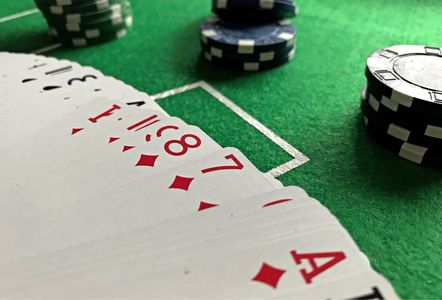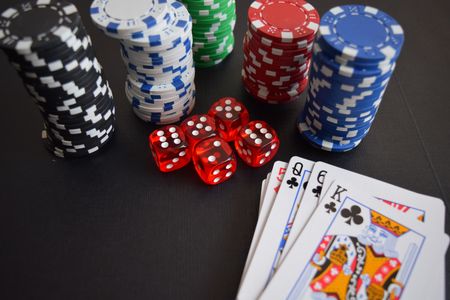Flop, Turn, And The River In Poker

Table of content:
- Managing Cards And Betting Rounds
- Important Strategies Of Flop, River And Turn Rounds
- Summing Up
- FAQ's
Ever wonder how a seemingly simple game like Texas Hold'em can turn into a nail-biting battle of wits? The answer lies in three crucial moments: the flop, the turn, and the river. These stages unveil hidden cards, shaping hands and turning the tide of the game. Buckle up for a deep dive into these poker turning points, where fortunes are won and lost on a single card reveal.
GetMega is an amazing platform that lets you play Hold'em Poker with friends & family with real money. Sounds fun, isn't it? Download the GetMega Hold 'em Poker now!
In this article, we will discuss the flop turn river, including the flop, turn, and river, meaning also, we will also gather strategies about poker flop river turn. So, let’s get started!
Managing Cards And Betting Rounds
After the initial cards are dealt with at the beginning of the game, players are typically called upon to act individually, moving clockwise around the table. Every player can generally make one of the accompanying moves throughout the game in the flop turn river betting rounds when it is their chance to act:
- Check – To check means to decline the chance to open the betting. Players can check when no bet is made during the current round, and the demonstration of checking passes the activity clockwise to the following individual in hand. If all the active players check, those players stay in hand, and the round is considered complete.
- Bet – Players may bet if no different players have bet during the current round. When a bet has been made, different players must 'call' by matching the sum bet to stay in hand.
- Fold – Players who fold, relinquish their cards, and can't win or act again during the current hand.
- Call – Players can call if different players have bet during the current round; this requires the calling player to match the highest bet made.
- Raise – Players may raise if different players bet during the current round; this requires the raising player to match the highest bet made and make a more noteworthy one by subsequently increasing the highest bet made before. All resulting players must call the raise or raise once more ('re-raise) to remain in hand.
Various variations of poker have distinctive betting rounds. Texas Hold'em and Omaha are the two most mainstream poker games on the planet. They have indistinguishable betting structures, with four betting rounds known as poker flop river turn or the flop river turn betting rounds.
The pre-flop betting round starts when all players have gotten their opening cards, known as the hole cards, before any community cards have been managed and dealt on the board; betting on the flop happens after the initial three community cards are dealt; on the turn,,, after the fourth community card, and the river after the fifth and last community card.
To start with, you are dealt two opening cards. After this comes, the flop turns river rounds, where you get to see 5 or 7 cards, depending on your game.
Lets us understand flop turn river in detail:-
The Flop in Poker
The flop refers to the first three community cards dealt face-up on the table after the first round of betting is complete.
After a series of betting for the opening cards or the hole cards, a card is burned off the highest point of the deck (which means disposed of without being taken a look at — this is done on the off chance that the top card had by one way or another been uncovered or checked). Three cards are dealt face-up to the center point of the table. This is known as the flop and is the beginning of the community cards on the table that everybody may consolidate in his hand.
Every individual not folded now has a five-card hand — two opening cards or hole cards joined with the three community cards. A series of betting takes place.
The Turn in Poker
The turn indicates the card taken from the deck after the flop betting round, and a fourth community card is uncovered. This card is also known as the fourth street.
After the flop betting round, another card is taken from the deck, and a fourth community card is uncovered. This card is known as the turn (also known as the fourth street).
All players still in hand have six cards to browse to make their best five-card Poker hands. Another round of betting and one more community card is yet to be uncovered.

The River in Poker
The river is the last card dealt in a poker game.
After a card is burned and the most scandalous of the community cards, the river (fifth street) is dealt.
A card is burned, and the most scandalous of the community cards, the river (also known as the fifth street), is dealt. All leftover players now have seven cards for choosing their best five-card Poker hand (their two-hole cards joined with the five community cards). A series of betting happens; the best five-card hand at the table is the victor.
To decide their five-card hand, players may utilize zero, one, or both of their opening hole cards in combination with five, four, or three shared community cards from the board, respectively.
Now that we know the basics and outlines of the poker flop river turn or the flop river turn let’s sum up with an example and then move on to discussing their strategies-
In Texas, hold 'em; the cards set by the dealer on the board are called the community cards. The shared community cards are managed in three stages: the flop, the turn, and the river. This isn't the situation in all poker varieties. However, you will confront this request in the most mainstream games, for example, Texas hold 'em and Omaha.
The initial three network cards are managed together and are known as the flop, the following card is the turn, and the absolute last card is the river. It can look something like this:
Flop: 3♠-A♠-7♣
Turn: K♥
Stream: J♦
These two last stages are called streets (fourth and fifth streets, separately), and betting rounds are on each street. There's additionally a division of the flop before and after: pre-flop and post-flop.
All in all, we can isolate a hand in poker in four stages with the following betting rounds. This will make some strategic conditions. It's an ideal opportunity to investigate these. Now you understand the flop turn river meaning we shall discuss the strategies of texas hold'em flop river.
Below are the poker flop river turn strategies -
Important Strategies Of Flop, River And Turn Rounds
A few players are hesitant to fold their hands before all the community cards are uncovered on the table. However, remaining in hand and calling bets with average hand possessions simply because you need to check whether your hand will improve or to be certain beyond a shadow of a doubt that the adversary has you beaten is exceptionally a long way from an ideal procedure.
There are unquestionably a few situations when approaching a few streets is the correct methodology; however, just when the chances are positive. In poker, we don't need negative chances and would prefer not to be uninvolved. We need to work either before the flop or straightforwardly after it – this said as a rule, not as an exacting standard.
The working before the flop is founded on the strength of our opening hole cards. The advantages of persistence are immense, and a decent player in poker is a focused one (this is presumably obvious in all types of betting). This implies that an extraordinary number of beginning hands should be folded immediately.

The activity straightforwardly after the flop is basic. Here we should design our activities for all the leftover betting rounds. The call-and-keep-a-watch-out methodology is not good poker. Suppose we have a draw; for this situation, we should think about the chances and worth of making the hand (how enormous the pot will be).
On the off chance that we need a card to make a straight, yet two suite cards on the board likewise have been matched, it is a tremendous danger that our hand will be beaten by a flush or a full house regardless of whether we make the straight. Or, on the other hand, perhaps we will be compelled to set out the straight in a later betting round, confronting an extremely large bet. This is an illustration of awful arranging.
The best activity, by and large, is, in this manner, 1) to fold straightforwardly or 2) to make a bet or a raise. By betting or raising, we get data from the adversary's reaction, and, not the least; we get an opportunity of winning the pot immediately. This is a powerful method for playing poker.
You may also like to know more about: poker terminology.
Let’s move on to poker turn river rounds of the game -
Strategical deduction on the turn
Turn poker is regularly more chaotic than the flop. On the flop, you can generally attempt to win the pot with a c-bet, and it won't be too excessive. Yet, on the turn, the pot is always greater, and you should regularly consider stack responsibility from you and your adversary.
If your bet was called on the flop, would you bet again? This can be an exceptionally hard choice with minimal hand. If you bet once more, you will lose more cash against a superior hand; however, if you do not, you will show your shortcomings, and your rival could assume control over the activity.
Consider what will occur on the river when following up on the turn.
Strategical deduction on the river
No river, no fish.
Perhaps the main thing on the stream is to value the bet or not. The various players that have been called both on the flop and on the turn will act cautiously on the river and check. This could be right, yet often, your rivals call with a little hand, for instance, an ace pair with a more regrettable kicker, and you will lose the benefit by not betting a third time.
It is essential to see, however, that you ought not to bet when your adversary no doubt will call with preferable hands over yours and, in any other case, fold.
GetMega is an amazing platform that lets you play Hold'em Poker with friends & family with real money. Sounds fun, isn't it? Download the GetMega Hold 'em Poker now!
Summing Up
With this, we end our discussion about the poker flop river turn or the flop river turn rounds of betting. Now that you are aware of the basics of the flop turn river rounds and the strategies of the flop turn river rounds, you are more than ready to try your hand at a game of poker. Download the GetMega Poker app now, play a game with your friends, and have tons of fun!
FAQ's
What is the flop vs turn vs river?
- In Texas Hold'em poker, the flop, turn, and river refer to the three sets of community cards dealt face-up on the table. The flop comes first, followed by the turn, and finally the river, each followed by a round of betting.
Why is it called flop turn and river?
- The terms "flop," "turn," and "river" in poker refer to the stages in a hand of Texas Hold'em when community cards are dealt face-up. "Flop" derives from the cards being "flopped" face-up, "turn" refers to turning a card over, and "river" to the last card in a hand.
Who is first to bet after the flop?
- In Texas Hold'em, after the flop, the player to the left of the dealer button is first to act, known as being "under the gun.”
How many burns before the flop?
- In Texas Hold'em, the dealer burns (discards) one card from the deck before dealing the flop, then burns another card before dealing the turn, and finally burns one more card before dealing the river.
What card game has the river flop?
- The river, flop and turn are all terms related to the Texas Hold’em variant of the poker game.
| Question | Answer |
|---|---|
| What is poker turn river flop? | In the game of poker, it is crucial to know about the turn river flop. The opening or throwing down the starting hand is termed as the poker flop, after the flop, the turn is the fourth community card that is exposed, and the final card that has the capability to make or break the game is called a river in poker. |
| How do you play the turn river flop? | A poker flop comes first in poker serially, then comes the turn, and after that poker river. Gain some basic knowledge about these terms and then depending on your hands you can bet, call, or raise. As soon as the poker river card is reached, wisely use of that card to defeat your opponent |
| Title | Slug |
|---|---|
| Raked Hands in Poker | raked-hands-in-poker |
| The Term Double Up In Poker | the-term-double-up-in-poker |
| Back Raise In Poker: Definition, Uses, How To Play, & Example | backraise-in-poker |

